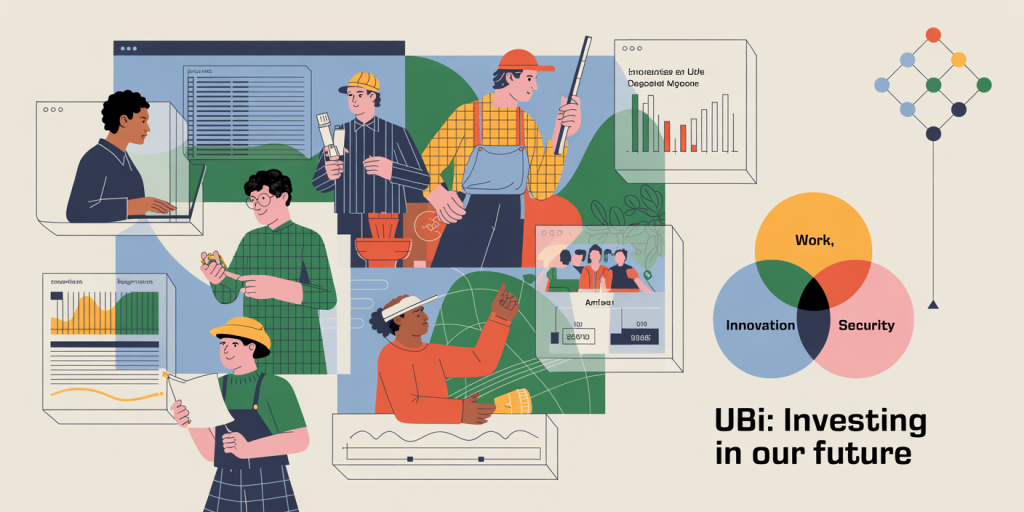Universal Basic Income (UBI) has emerged as a highly debated economic policy concept worldwide. The idea is simple: an unconditional, regular cash payment to all citizens regardless of employment status or wealth. Advocates claim it could alleviate poverty, reduce inequality, and provide economic security in an era of rapid technological disruption. Critics, however, worry about affordability, inflationary pressures, and potential disincentives to work. But can a Universal Basic Income genuinely work in practice? This article unpacks the feasibility of UBI through data-driven analysis, real-world pilots, and economic theory, offering a comprehensive exploration of its potential, challenges, and future outlook.
Understanding Universal Basic Income: Definition and Rationale
Universal Basic Income is a guaranteed, periodic payment provided by the government to every individual within a defined population, irrespective of their socio-economic status or employment. Unlike targeted welfare programs, UBI is designed to be unconditional and universally accessible without means testing. The rationale behind UBI hinges on multiple social and economic objectives: ensuring a minimum standard of living, streamlining social welfare systems, and preparing societies for labor market changes caused by automation and artificial intelligence.
Several countries and think tanks have put forward arguments supporting UBI as an anti-poverty tool. For instance, Finland’s 2017-2018 basic income experiment provided 2,000 unemployed individuals with €560 per month without conditions, aiming to study its effects on employment and well-being. Similarly, Kenya’s non-governmental organization, GiveDirectly, initiated a long-term UBI trial involving thousands of recipients receiving monthly unconditional payments. These examples highlight the growing interest in understanding UBI’s real-world impact beyond theoretical discourse.

Economic Implications: Can UBI Stimulate or Stifle Growth?
One of the primary economic debates around UBI is whether it encourages labor force participation or discourages work by reducing the need to earn income through employment. Critics argue that if people receive guaranteed money regardless of employment, they might reduce their work effort, negatively impacting productivity and economic growth. Conversely, proponents suggest UBI could empower individuals to pursue meaningful work, education, or entrepreneurship without the pressure to survive paycheck to paycheck.

Finland’s experiment found minimal impact on employment levels — recipients did not significantly reduce working hours, yet reported improved mental health and life satisfaction. Similarly, Stockton, California, carried out a guaranteed income pilot providing $500 monthly to select residents, resulting in reduced income volatility and increased full-time employment for recipients. These findings suggest that UBI might not negatively impact labor participation as feared, though the scale and duration of pilots require further research for conclusive evidence.
UBI could also stimulate economic demand by providing people with spending power, especially those at the lower end of the income spectrum who tend to spend additional income immediately. Economic stimulus driven by UBI can be particularly crucial during recessions or periods of technological disruption that reduce labor demand. However, a significant challenge remains: funding UBI sustainably without excessive taxation or inflation.
| Country/Region | Pilot Type | Monthly Payment | Impact on Employment | Effects on Well-being |
|---|---|---|---|---|
| Finland | Government-led | €560 | No significant change | Increased mental well-being |
| Stockton, USA | City-level project | $500 | Increase in full-time jobs | Reduced income volatility |
| Kenya (GiveDirectly) | Long-term NGO-led | Approx. $22 | Ongoing study | Early signs of improved nutrition |
| Canada (Ontario) | Government pilot | CAD $1,370 | Pilot ended early, inconclusive | Reported improved financial security |
Social Benefits and Poverty Alleviation
Poverty reduction constitutes one of the most commonly cited benefits of UBI. Traditional welfare programs often involve complex eligibility criteria and stigmatization that can exclude vulnerable groups or disincentivize gradual improvements in income to avoid benefit loss. UBI, being universal and unconditional, can eliminate bureaucratic barriers and provide a reliable income floor, thus improving social inclusion.

Statistically, poverty and income instability are persistent problems globally. According to the World Bank, approximately 9% of the world’s population lived on less than $2.15 per day in 2017. In developed countries, despite social safety nets, precarity remains due to underemployment, gig economy jobs, and housing costs. UBI could act as a buffer against these vulnerabilities. Early trials in countries like India and Brazil have indicated reductions in food insecurity and better health outcomes among participants receiving cash transfers, illustrating concrete benefits of direct income support.
Furthermore, UBI could improve gender equality by empowering caregivers, predominantly women, who often engage in unpaid labor but lack financial independence. By providing direct income, UBI could reduce dependency and enhance bargaining power within households. These potential social benefits underline the multi-dimensional impact UBI can have beyond economics.
Challenges: Funding and Inflation Risks
Perhaps the most substantial hurdle in implementing UBI lies in its funding. Providing every citizen with a regular cash payment represents a significant fiscal outlay, particularly in larger countries with diverse populations. Estimates vary, but providing $1,000 monthly to all Americans, for example, could cost over $3.8 trillion annually, nearly double the current federal budget.
Different funding mechanisms have been proposed: increased taxation on wealth, higher income taxes, value-added taxes, carbon taxes, or redirecting existing welfare budgets. Each method carries political and economic trade-offs. For example, higher taxes may dampen incentives for investment or entrepreneurship, while cutting existing social programs to finance UBI could leave vulnerable populations worse off if payments are insufficient.
Another concern is inflationary pressure. Injecting substantial purchasing power into the economy could raise prices, eroding the real value of UBI payments, particularly in housing and essential goods. However, the inflation impact largely depends on supply-side conditions; if UBI stimulates demand in an economy running below capacity, inflation may be muted. Empirical evidence from pilots has not shown marked inflation effects, but scale and duration in these trials are limited compared to full-scale national introduction.
Technological Change and the Future of Work
Automation and artificial intelligence are reshaping labor markets worldwide, potentially displacing millions of jobs across sectors. In this context, UBI is often presented as a social adaptation to technological unemployment, providing income security amidst economic transformation. This perspective recognizes that the nature of work is changing, and traditional welfare may be ill-suited for gig economy realities characterized by income volatility and insecure contracts.
The 2016 study by Oxford University estimated that 47% of US jobs were at high risk of automation within two decades. Countries such as Japan and South Korea, facing aging populations and labor shortages, are exploring UBI to supplement incomes and support evolving workforce dynamics. The assumption is that with a guaranteed income, individuals can retrain, start businesses, or engage in caregiving or creative work without the existential pressure of job loss.
However, critics caution that UBI alone will not address deeper structural inequalities or the need for comprehensive labor market reforms, education, and social services. UBI can be part of a broader strategy but is not a panacea for the complex socio-economic shifts underway.
Looking Ahead: The Viability and Design of Future UBI Systems
As interest in Universal Basic Income grows, future success depends heavily on design specifics, societal context, and political will. Small-scale pilots provide encouraging insights into social benefits and labor market neutrality but scaling up requires navigating complex fiscal, inflationary, and distributional challenges.
Hybrid models integrating conditional programs with basic income-like elements could bridge the gap between universal support and targeted welfare efficiency. For example, negative income tax schemes provide a guaranteed minimum income while incentivizing employment, addressing some funding and behavioral concerns.
Technological tools such as blockchain and digital currencies may facilitate efficient and transparent UBI delivery, especially in developing countries with weak administrative capacity. Moreover, ongoing experiments, such as in Spain and Scotland, will provide richer data on long-term impacts, informing policy refinement.
Ultimately, Universal Basic Income’s success depends on a nuanced understanding of economic context, social goals, and political feasibility. It appears viable as part of a comprehensive social safety strategy but requires innovation in funding, targeting, and public acceptance. As automation and inequality challenge traditional welfare, UBI remains a bold, evolving solution at the center of global debate.

Deixe um comentário